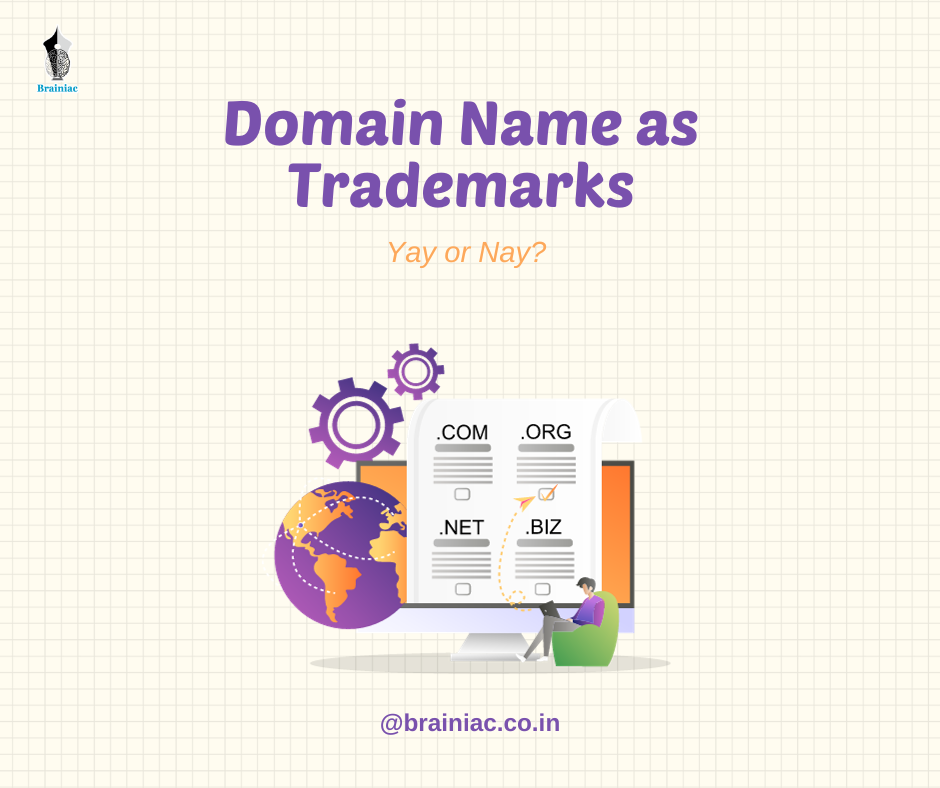Introduction
Domain names have become valuable assets in today’s increasingly digital world, where businesses rely heavily on their online presence. Understanding the relationship between domain names and trademarks is critical in intellectual property law. This article delves deeper into the importance of domain names as trademarks in India, shedding light on the legal framework governing their protection as well as the evolving challenges businesses face in the virtual realm.
Understanding Trademarks
A trademark, as defined by Section 2(1) (Zb) of the Trademarks Act, 1999, is any mark used in relation to goods or services that can be graphically represented and distinguishes the goods or services of one person from those of others. Trademarks play a multifaceted role, serving not only as identifiers but also as powerful tools for brand recognition and consumer trust.
Trademarks are essential for distinguishing one’s products or services from competitors, developing brand identity, and establishing consumer trust. They serve as distinct symbols, words, or combinations of these that distinguish businesses in the marketplace. In the digital age, where businesses operate globally, trademarks are critical for creating a distinct and recognisable brand image.
Understanding Domain Names
A domain name is a human-readable address that allows internet users to access a specific website. It acts as a distinct identifier for an online presence, making it an essential component of a brand’s identity. The Domain Name System (DNS) converts domain names into IP addresses, allowing for easier internet navigation.
Domain Names as Trademarks
When considering their dual functions, the relationship between domain names and trademarks becomes clear. For starters, domain names serve as easily recognised trademarks, allowing prospective customers to easily connect with a specific company. In the digital age, where businesses compete for online visibility and consumer attention, this connection is critical.
Secondly, businesses aim to establish and showcase their popularity in the virtual world, making domain names an essential part of their overall brand identity. In the case of Celador Productions Ltd. v. Gaurav Mehrotra, the court emphasized that a domain name is more than just a web address; it serves as an informational tool about the owner’s goods and services, warranting protection.
Why is it important to have domain names as Trademarks?
Registering domain names as trademarks is essential for brand protection, preventing cybersquatting, and establishing credibility in the digital space. This legal step ensures exclusive rights to the online identity, offering recourse against infringement and promoting global recognition. It enhances consumer trust, as a registered trademark signals authenticity. Businesses across various sectors, such as e-commerce platforms, online content providers, technology companies, digital marketing agencies, and social media platforms, benefit from this dual protection, safeguarding their unique online presence and brand reputation.
The legal standing of Domain Names
Although there aren’t explicit provisions for registering domain names under trademark law, safeguarding them is achievable by linking them to brand names, which are subject to the specific provisions detailed in the Trademarks Act of 1999. Similar to that of trademark registration process, the process of registering a domain name as a trademark entail meeting the criteria outlined in Sections 9 and 11, addressing absolute and relative grounds for refusal, respectively.
Section 9 of the Trademarks Act, 1999, delineates absolute grounds for refusal, and it plays a pivotal role in determining the eligibility of a domain name for trademark registration. The key considerations under this section include:
Descriptiveness: Descriptive terms or those that directly allude to the nature, quality, or characteristics of the goods or services in question may face challenges in registration. This aligns with the objective of ensuring that trademarks are not merely descriptive but serve to uniquely identify a business.
Generic Terms and Common Usage: Domain names that consist of generic terms or are commonly used in a particular trade may face challenges in registration. This is to prevent the monopolization of terms that are necessary for others in the industry to use.
In the case of Bigtree Entertainment v. Brain Seed Sportainment, the court deliberated on the distinctiveness of a descriptive term, “BOOK MY,” within a domain name. The court’s ruling emphasized that this descriptive term lacked the requisite distinctiveness, rendering it ineligible for trademark protection. This decision underscores a crucial aspect of trademark law—the necessity for a domain name to possess distinctive elements. The ruling recognizes that distinctive domain names play a pivotal role in preventing consumer confusion, thereby highlighting the importance of ensuring uniqueness in the online space.
Section 11 deals with relative grounds for refusal and comes into play when assessing the similarity of a domain name to existing marks in use. Key aspects of Section 11 include:
Similarity to Existing Marks: If a proposed domain name is found to be similar to existing trademarks, especially those already registered or in use, it may be refused registration. This provision aims to protect the rights of existing trademark owners and prevent confusion in the marketplace.
Market Presence and Reputation: The section considers the market presence and reputation of existing trademarks. If a domain name is deemed similar to a well-established mark, it may be refused registration to avoid dilution of the distinctive character and reputation of the existing mark
Conclusion
In today’s world, where both online and offline aspects are crucial, safeguarding domain names as trademarks isn’t just a legal requirement—it’s a vital strategy for businesses aiming for long-term success in the digital age. As technology advances, the legal system needs to keep up to effectively tackle new challenges. This adaptation ensures that businesses can confidently manage their online presence and shield their brand in the ever-changing digital environment.


